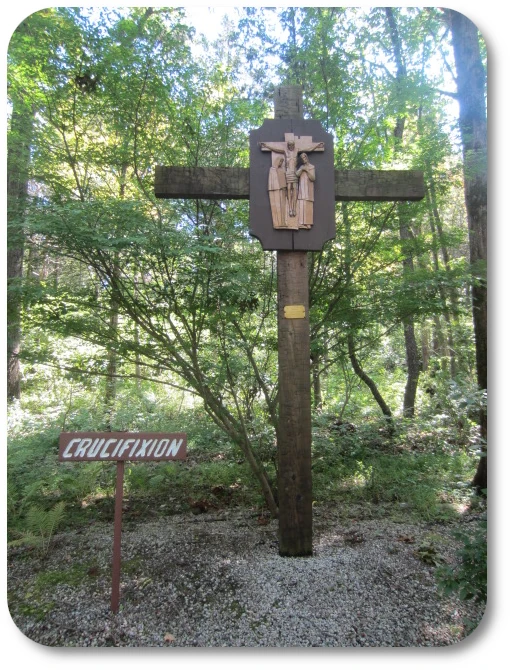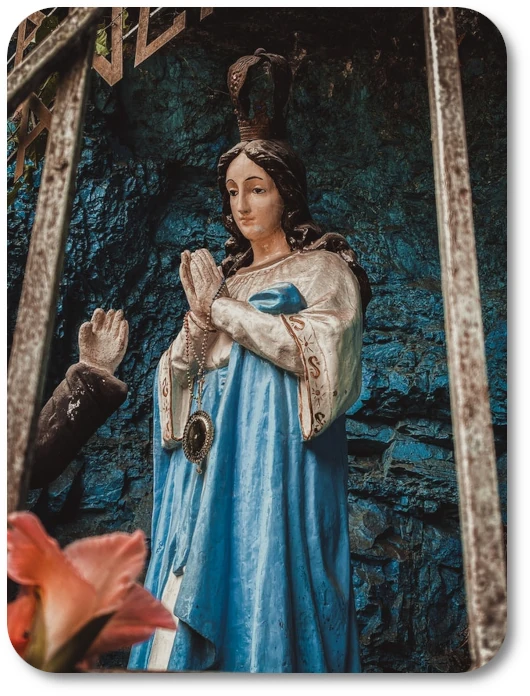- Rosary
- Station Options
- Blue Army All Stations
- Station 12
Blue Army Twelfth Station
The Blue Army Twelfth Station of the Cross marks the climax of Jesus' Passion: His crucifixion and death. This moment is central to Christian faith, as it represents the ultimate sacrifice for the redemption of humanity. The image of Jesus hanging on the cross, His final words, and the reactions of those present are all rich with theological meaning and emotional depth.
Jesus Dies on the Cross

Blue Army Twelfth Station
V. We adore Thee, O Christ,
and we praise Thee.
R. Because by Thy holy Cross,
Thou hast redeemed the world.

Prayer
My Jesus, I kiss devoutly the Cross on which Thou didst die for me. Thy death is my hope. By the merits of Thy death, give me grace to die embracing Thy feet and burning with love for Thee.
The Way of the Cross of Saint Alphonsus Liquori
Our Father...
Hail Mary...
Glory Be...
v. Have Mercy upon us O Lord.
r. Have Mercy on us.
May the souls of the faithful departed, through the mercy of God, rest in peace.
The Seven Last Words of Jesus
Jesus' final words from the cross are profound statements that encapsulate His mission and love for humanity:
- "Father, forgive them, for they know not what they do" (Luke 23:34): A plea for forgiveness for those who crucified Him.
- "Truly, I say to you, today you will be with me in paradise" (Luke 23:43): A promise of eternal life to the repentant thief.
- "Woman, behold your son; behold your mother" (John 19:26-27): Jesus' care for His mother and John, entrusting them to each other.
- "My God, my God, why have you forsaken me?" (Matthew 27:46): A cry of desolation, quoting Psalm 22.
- "I thirst" (John 19:28): Expressing His physical suffering and spiritual longing.
- "It is finished" (John 19:30): The completion of His redemptive work.
- "Father, into your hands I commit my spirit" (Luke 23:46): His final surrender to God's will.
Ponder as Mary Pondered

Mary at the base of the cross is an image of boundless love, sacrifice, and compassion. Her presence in that moment transcends time and touches the hearts of believers across generations. For you, it’s about connection and empathy.
Mary had an unwavering love to stay with Jesus during His darkest hour. For me this is a lesson I can relate to by standing by loved ones during their struggles offering them my support and comfort.
I sit and watch Mary dealing with this grief and we all are now. It’s a powerful reminder that it’s okay to feel pain and sorrow deeply, and that sharing in the suffering of others can forge stronger bonds and bring deeper understanding.
Despite the overwhelming sorrow, Mary’s faith never faltered. Her presence signifies hope and resilience. This can inspire you to find light in the darkest of times, holding on to faith and hope even when things seem unbearable.
Mary’s quiet strength and profound empathy can remind you to look within for resilience and compassion. It’s about finding strength in stillness and grace under pressure.
Imagery
The imagery associated with the Twelfth Station is rich with symbolism. The cross itself is a powerful symbol of suffering, sacrifice, and redemption. Other symbols include:
- The Crown of Thorns: Represents Jesus' suffering and the mockery He endured.
- The Darkness: Signifies the gravity of the moment and the spiritual battle taking place.
- The Veil of the Temple: Its tearing at Jesus' death symbolizes the end of the old covenant and the beginning of direct access to God through Jesus.
It's not the End
The Blue Army Twelfth Station is not the end of the story; it points forward to the hope of the Resurrection. Jesus' death on the cross, while a moment of sorrow, is also the gateway to new life. Believers are reminded that through suffering and death, there is the promise of resurrection and eternal life.
Darkness and the Veil
To the people, this darkness would have felt ominous, a physical manifestation of the dread and sorrow that was taking place. It's as if nature itself was mourning the death of Jesus. This darkness represents spiritual blindness and the world's sin, but also sets the stage for the coming light of the Resurrection.
The tearing of the temple veil is rich with significance. This veil separated the Holy of Holies, where God's presence dwelled, from the rest of the temple where people were. It was a symbol of the separation between God and humanity. Through His death, Jesus opened the way for direct access to God for all people. The tearing of the veil signifies the end of the old covenant and the beginning of a new relationship with God.
The reactions of the crowds and soldiers are a mix of fear, awe, and a dawning realization of the enormity of what had happened. The tearing of the veil and the darkness both symbolize a dramatic shift in the spiritual landscape, ushering in a new era of divine accessibility and redemption. The earthquake also would have signified a fearful moment. This moment invites all to reflect on their own spiritual state and the access they now have to God through Jesus' sacrifice.
